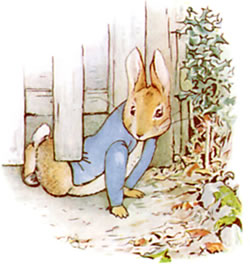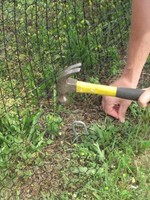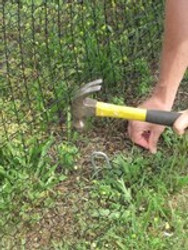Fencing Out Rabbits and Small Animals
Posted by Deerbusters on 29th Apr 2014

You have worked endless hours tilling, weeding and digging to create a beautiful yard and garden only to wake up one morning and discover something has been using your garden as its midnight buffet. Your first instinct is to turn into Mr.McGregor, that troubled angry gardener from The Tale of Peter Rabbit, and stalk the prey with a rake.
The best thing to do however, is to take a step back and figure out what exactly
is eating your flowers and vegetables. If you have ruled out birds and deer, you probably have a small pest problem. Smaller chewing animals are much harder to deter from the garden than large wildlife pests like deer.
Small Animal Problems
Small animals can chew, push, or dig under most conventional fencing, making your deer fencing useless in defending your garden. The main offenders are rabbits, groundhogs, possums, armadillos and raccoons, which will all wreck havoc in the garden. Lucky for you, there are a few solutions to keep those pesky critters from your garden for good.
For smaller gardens, individual beds or plants, motion activated repellers and liquid repellents can be used with great success. However, if dealing with an entire yard or larger garden, installing a rodent barrier fence is your best solution for dealing with small chewing wildlife.
Rodent Barrier Fencing

Rodent barrier fencing generally measures between 2 and 3 feet in height and can be installed as a standalone fence or in conjunction with a standard or deer fencing system. Rodent barrier is different from other types of fencing since it has a hexagonal mesh with holes as small as 1” and is constructed of galvanized steel. The galvanized steel makes it almost impossible for rabbits and other chewing animals from breaking though the fencing.
The installation of a rodent barrier fence also defends against small wildlife. Traditional fencing sits flush or just above ground level, which allows groundhogs, opossums and other wildlife to scoot under the fencing and into your prized garden. The rodent barrier, however, is designed to flare out and skirt the ground creating an additional obstacle for the animals. The fencing is then staked into the ground to create a dig-proof area around the fence line.
Rodent barrier is easy to attach to existing fencing using hog rings and zip ties. A 20×20 garden should only take approximately 1.5 hours to completely install, making it a great weekday project. With the proper planning and tools, you can save your garden this season and keep yourself from becoming the Mr. McGregor of the neighborhood.
For more information on rodent barrier fencing or any wildlife control issue visit Deerbusters.com or email [email protected].

